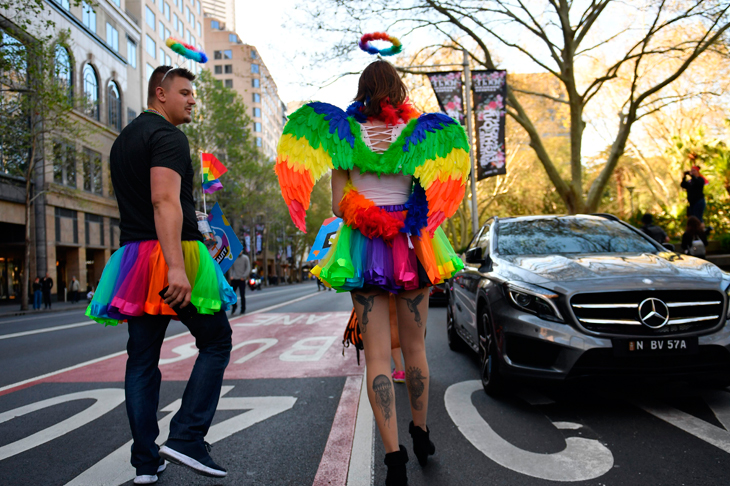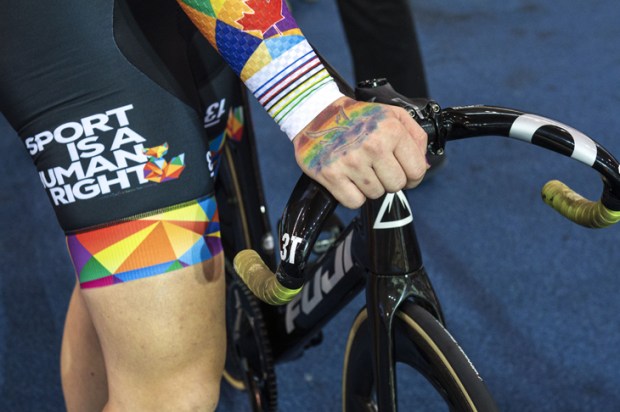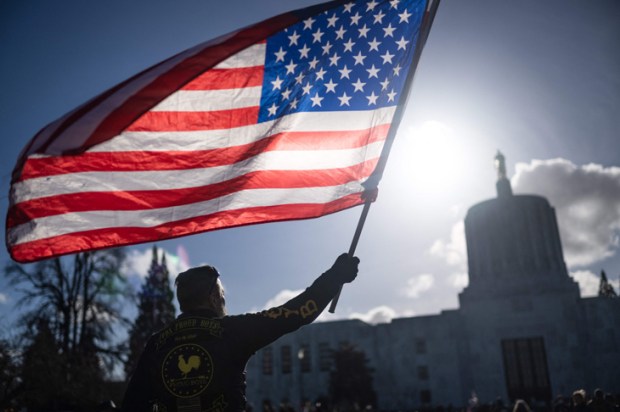Not all homosexuals are cowering in corners as they suffer the dreaded hate speech of the same-sex marriage debate; indeed, one gay couple with whom I am friends are making the most of the moment and have turned it into their party trick du jour.
Knowing, of course, that everyone is tiptoeing carefully around their sensibilities, and assuming they would be voting in favour of SSM, they quickly introduce the topic into conversation, and announce briskly that they are not in favor of same-sex marriage, and have voted No in the plebiscite.
Then they stand back and watch the jaws drop.
Épater la bourgeoisie and all that. Fun.
These are two sophisticated, well-travelled older men with a wide and international circle of friends who have been together for many decades. They know of three other gay couples voting No in the plebiscite.
‘I can’t see the need for it,’ one said to me. ‘We’ve got all the rights we need, what do we want with a marriage certificate?’
The issue opened, I mentioned the iconic gay writer Edmund White, who reviewed SSM arguments in a New York Times Review of Books cover story a couple of years ago. It stuck in my mind for the very puerility of his first argument. Let White put it himself: ‘At first many gay progressives (including me) frowned on this initiative, since it seemed only one more example of assimilation. But we began to see that it was a cause worth fighting for. If bigots oppose gay marriage so vehemently, it must be because marriage is a defining institution for them; gays will never be fully accepted until they can marry and adopt, like anyone else.’
What he’s saying is that gay marriage must be worth having, simply because ‘bigots’ don’t want them to have it. So, it’s a power grab. You’ve got it, I want it, give it to me. I can hear the kids’ playground chant of Nyah Nyah ringing in my ears.
What did my friend think of that? He was much pithier. ‘I think they (the gay community) just want to say, Up yours!’ he said.
White’s piece goes on to talk about how gays are now accepted as ‘normal, loving, decent members of… our communities’ and introduces a concept called ‘covering’, described as downplaying a discordant trait in order to blend into the mainstream.
He concludes: ‘I shouldn’t quibble, but as a gay man in his seventies I don’t quite recognise in that description most of the flamboyant, creative, edgy, promiscuous, deeply urban gays I have known… It seems to me that gays are in danger of ‘covering’ in order to obtain the permission to marry. Perhaps that’s a small enough price. I can’t decide.”
So if ‘covering’ is indeed what is going on, then should the SSM case get up, we will soon see demands for marriage not to be necessarily exclusive or faithful, so as not to ‘discriminate’ against various homosexual or transgender or (add preferred acronym here) lifestyles. Think Village People or the Priscilla types in Gay Mardi Gras marches, rather than Cam and Mitch, the boys-next-door pair in TV show Modern Family. We have already seen three gay men ‘marry’ in Colombia. If the idea of marriage is stripped of fidelity and exclusivity, as well as gender, then the concept of marriage will mean almost nothing.
The Left seems determined to strip all traces of Christianity from the (once) Judaeo-Christian West. Some UK schools are now replacing BC (Before Christ) and AD with BCE (Before Common Era) and CE (Common Era), in the name of ‘inclusion’.
I don’t remember, when Malcolm Fraser’s government introduced multiculturalism here in the late 70s, being told that the inclusion of other cultures would mean the exclusion of our own. But if we don’t defend it, we will surely lose it. Prime Minister Justin Trudeau recently described immigrant Canada approvingly as the world’s ‘first post-national country… there is no core identity, no mainstream in Canada.’
My husband and I recently visited a large and well-known US religious community, where a senior church couple walked us around their major buildings and campus.
Many young people, spotting our guides, came up to say hello and by the end of our tour we had met nearly a score. I had a sudden insight that all the 20-somethings we had met were not only healthy and happy, but they were relaxed. I realised that the ordinary Western youth I knew were anything but relaxed. No angst, no weird fashions, no attitude, no awkward silences, just poised, straightforward and clear-eyed youngsters.
I mentioned this to one of my guides; she replied that these kids knew where they belonged, and where they were going, they didn’t have to make their mark and career in a difficult outside world. Maybe. Strict dietary guidelines may explain some of it. Maybe.
Like canaries in a coal mine, those experiencing change are often least able to judge it. Mainstream youngsters would have no idea that their tense, self-centred and complicated modern way of life wasn’t the only option, or even the best one.
As religious values become increasingly marginalised, many Australians will have to decide whether they can put up with living in a de-Christianised society, with all the brave new world, ‘progressive’ options that the Left wants to inflict on us.
Or they will have to withdraw, like some religious minorities in the United States. As someone with conservative Christian values I have already been expelled from Australia’s social majority to a minority in my lifetime, simply by continuing to believe in what most people used to believe in.
Will heterosexual marriage and such cultural baggage as the use of the terms BC and AD come to look like Amish bonnets and horses and carts to curious onlookers from the future? Will people who thought of themselves as part of Australia’s ‘core identity’ have to retreat, just to live what used to be regarded as a normal life?
Judging by the happy young faces I saw in Salt Lake City, this is not a change for the better.
Got something to add? Join the discussion and comment below.
Get 10 issues for just $10
Subscribe to The Spectator Australia today for the next 10 magazine issues, plus full online access, for just $10.
You might disagree with half of it, but you’ll enjoy reading all of it. Try your first month for free, then just $2 a week for the remainder of your first year.














Comments
Don't miss out
Join the conversation with other Spectator Australia readers. Subscribe to leave a comment.
SUBSCRIBEAlready a subscriber? Log in